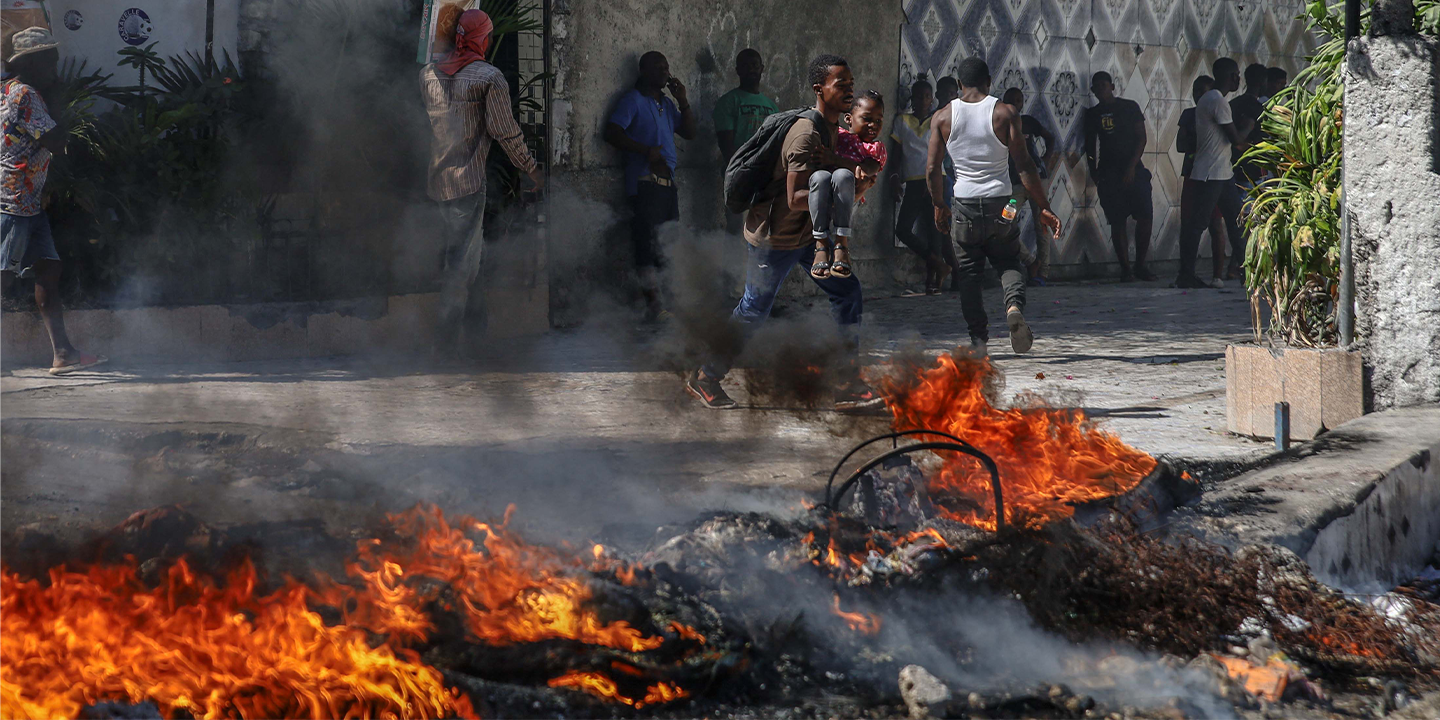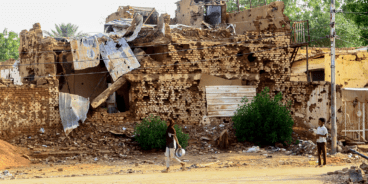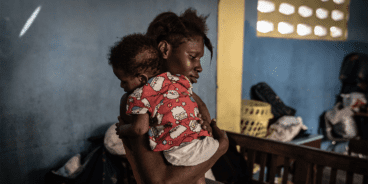

Atrocity Alert No. 346: Haiti, Nicaragua and China
Atrocity Alert is a weekly publication by the Global Centre for the Responsibility to Protect highlighting situations where populations are at risk of, or are enduring, mass atrocity crimes.
AMIDST UNPRECEDENTED INSECURITY, HAITIANS FACE CATASTROPHIC LEVELS OF VIOLENCE
Clashes between gangs in Haiti and vigilante killings are surging to unprecedented levels, with violence becoming more frequent and deadly as groups attempt to expand their control. The UN recorded more than 600 people killed in April alone, including at least 164 people murdered in mob killings and lynchings. Recent videos and pictures shared on social media show mobs assaulting men – alleged gang members – with large rocks and setting fire to gasoline-soaked tires placed around or on their bodies. Videos have also shown Haitians sharpening machetes and blocking entrances into neighborhoods as they pledge to rid the capital of gangs and protect their families and communities. In addition, 637 kidnappings have been reported so far this year, a 63 percent increase compared with the last three months of 2022.
During late April the UN Special Representative for Haiti, María Isabel Salvador, reported that gang violence is spreading at an “alarming rate” in areas previously unaffected by violence, with a “shocking increase in criminality and abuses.” Likewise, the UN Secretary-General, António Guterres, warned in his latest report that insecurity in the capital, Port-au-Prince, “has reached levels comparable to countries in armed conflict.”
The violence is fueled in part by the power vacuum created since the assassination of then-President Jovenel Moïse in July 2021, with some 95 gangs fighting over territory in Port-au-Prince. The UN has estimated that armed groups control up to 80 percent of Port-au-Prince. Amidst growing insecurity, the Haitian National Police (HNP) has lacked the capacity to combat their territorial expansion and protect residents. Warning against a “never-ending cycle of violence,” UN High Commissioner for Human Rights, Volker Türk stressed that, “It is the State’s obligation to protect its citizens… But the reality is that the State does not have the capacity to respond. People are thus taking the law into their own hands – but this will only fuel the spiral of violence.”
As of mid-March, at least 160,000 people were displaced by the violence. On 28 April the UN Committee on the Elimination of Racial Discrimination highlighted that Haitians on the move, including on migration routes, at borders and in detention centers in the Americas region, have faced killings, disappearances, acts of sexual and gender-based violence and trafficking. Additionally, over 36,000 people of Haitian origin were deported during the first three months of this year, among whom an estimated 90 percent were deported from the Dominican Republic.
The prevalence of gang violence and increasing human rights violations puts populations in Haiti at risk of mass atrocities. The international community must strengthen its support to Haitian authorities, including by bolstering the capacity of the HNP. Regional states must end the collective expulsions of Haitians and uphold their obligations under international refugee and human rights law.
GOVERNMENT REPRESSION CONTINUES TO INTENSIFY IN NICARAGUA
Last Wednesday, 3 May, at least 40 critics of the Nicaraguan government, including political opponents, independent journalists, human rights defenders and peasant activists, were detained in a massive police raid overseen by President Daniel Ortega and his wife, Vice-President Rosario Murillo. Many of the individuals detained were subsequently placed under house arrest for “conspiracy to damage national integrity and the spreading of false news.”
The newspaper El País warned that this operation was “the highest number of detentions registered on a single day since the 2018 paramilitary operation known as ‘Operation Clean-Up,’” when police and pro-government groups brutally crushed country-wide protests through arbitrary arrests, torture and the widespread use of lethal force. Since then, the Ortega government has intensified a systematic campaign to dismantle democratic institutions and civic space. In March, the UN Human Rights Council-mandated Group of Human Rights Experts on Nicaragua warned in its first report that since 2018 authorities have committed crimes against humanity, including persecution, murder, imprisonment, torture, sexual violence and politically motivated persecution in attempts to “eliminate, by different means, any opposition in the country.”
Government repression has intensified in recent months. In early February, authorities revoked the citizenship of more than 300 alleged political opponents and forcibly deported 222 of these individuals to the United States. On the fifth anniversary of protests on 18 April, Amnesty International warned that “far from ending its policy of repression, the Nicaraguan government continues to expand and reinvent it and incorporate new patterns of violations,” including through “excessive use of force, use of criminal laws to unjustly criminalize activists and dissidents, attacks on civil society and forced exile.”
The country’s judiciary has become a key instrument in ongoing political persecution and systematic repression by facilitating mass raids and revoking citizenship. Arbitrary criminal prosecutions, violations of due process rights, unfair trials and the instrumentalization of detention are being systematically used to silence political opposition and create a climate of fear. Human rights defenders have warned that many victims affected by the latest round of detentions did not come forward out of fear for reprisals against family members.
Nicaragua’s total isolation from regional and international institutions, persistent impunity and the complete instrumentalization of state institutions facilitate ongoing political persecution. In the absence of coordinated, robust strategies by the international community, including governments in the region, crimes against humanity are likely to continue.
SOPHISTICATED MASS SURVEILLANCE IN XINJIANG FACILITATES ONGOING ATROCITIES
Mass surveillance by Chinese authorities against Uyghurs and other majority-Muslim ethnic groups has become a defining feature of government repression in the so-called Xinjiang Uyghur Autonomous Region (XUAR). On 4 May Human Rights Watch (HRW) released an investigation into phone search programs in XUAR, revealing that police “rely on a master list of 50,000 multimedia files they deem ‘violent and terrorist’ to flag Uyghur and other Turkic Muslim residents for interrogation.” According to the investigation, authorities conducted nearly 11 million searches of 1.2 million mobile phones in Xinjiang’s capital, Urumqi, during a nine-month period between 2017 and 2018 alone. HRW reviewed 1,000 files that matched those on the police master list and found that approximately 57 percent “appear to be common Islamic religious materials,” including readings of the Quran. In some cases, possession of the files may form the basis of detention and imprisonment.
The practice of Islam has effectively been outlawed in XUAR due to purported concerns over “extremism.” Abuses against Uyghurs and other majority-Muslim ethnic groups significantly intensified when the “Regulation on De-extremification” passed in 2017, which banned a range of apparently “extreme” behaviors, like “abnormal” beards and Islamic-sounding names. Since 2017 the government has also destroyed or damaged about 16,000 mosques in Xinjiang. Over 1 million people, mainly Uyghurs, have been arbitrarily detained in “re-education” or “de-extremification” facilities since then.
The widespread use of facial recognition cameras and the forced collection of biometric data, as well as police checkpoints and the use of community informants, have turned XUAR into a de facto police state. In August 2022 the Office of the UN High Commissioner for Human Rights warned that abusive powers given to police and security forces, as well as domestic legislation on criminal procedure and counterterrorism, facilitate possible crimes against humanity and “provide legal underpinning for what has been alleged to be a sophisticated, large-scale and systematized surveillance system in practice, implemented across the entire region both online and offline.” The Chinese government’s systematic attempt to erase the history and identity of Uyghurs and other groups also provides further evidence of possible genocide.
As mass surveillance has become a key instrument for facilitating atrocity crimes in XUAR, tech companies may be complicit in state-led repression. Savita Pawnday, Executive Director of the Global Centre for the Responsibility to Protect, said, “Private businesses must immediately halt the provision of new surveillance technologies to Chinese authorities and rigorously implement due diligence policies to assess whether their software is used to enable state repression. Governments should impose extensive sanctions against private businesses facilitating mass surveillance in XUAR.”
Related Content


Atrocity Alert No. 432: Sudan, Venezuela and Haiti
